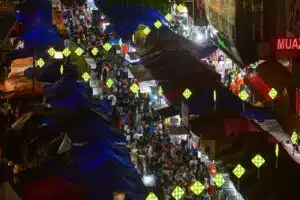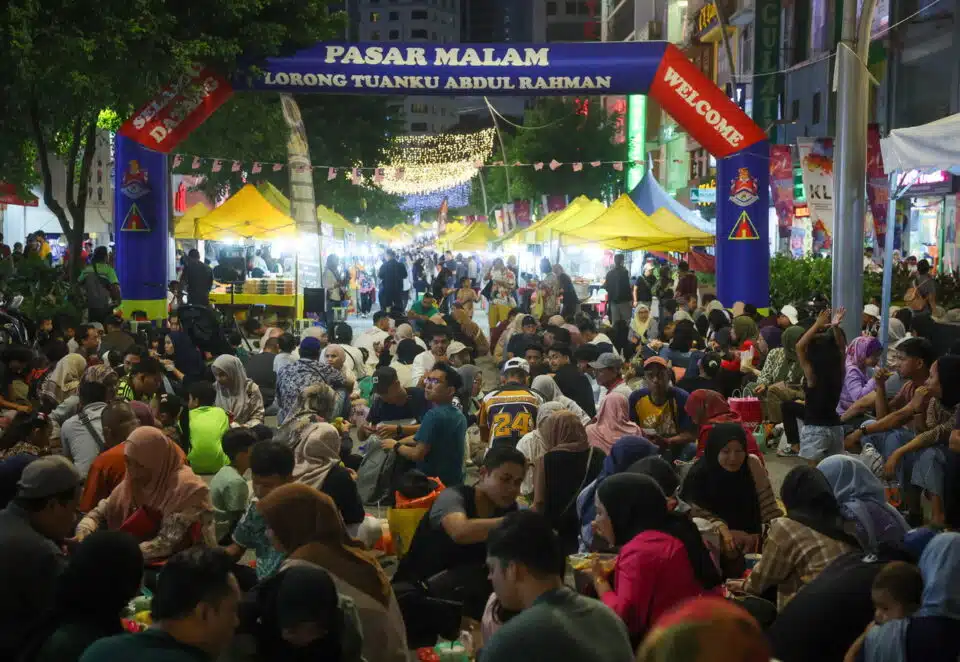KUALA LUMPUR, April 5 — The Hari Raya Aidilfitri bazaar, like the one located on Jalan Tuanku Abdul Rahman (TAR), has consistently provided income for numerous small-scale traders annually.
However, this Ramadan, they are generally voicing discontent over diminished sales compared to prior years.
Baju Melayu and samping seller Aziz Muhammad, 43, said his sales have plummeted by almost 60 per cent compared to the pre-Covid-19 years.
He attributed this sudden decline to various factors, including the festive season occurring after the start of the new school term, which causes parents to be more modest in their spending for Aidilfitri, and the emergence of e-commerce platforms like TikTok Shop.
“It cannot be denied that we are in an era of online sales, which indeed impacts bazaar traders like us.
“Traders on TikTok and other online platforms do not need employees or rental space, so they can ‘slash prices’, selling at much lower prices,” he said to Bernama.
Aziz added that this also makes him inclined to try selling the Malay traditional attire online in the near future.
“Even though we are actually more comfortable when customers come in person to try on the clothes we sell because we tailor them ourselves, we also need to keep up with the times,” he said.
Aziz said that although the Jalan TAR bazaar appears crowded, especially at night, many visitors come only to experience the atmosphere leading up to Aidilfitri or just to window shop.
For hijab trader Wan Hayati Wan Jaffar, 56, the government needs to take appropriate steps to protect small traders like herself, who struggle to compete with TikTok traders in terms of selling prices.
“TikTok traders do not mind making profits of RM1, RM2, as long as they can sell a lot. Small traders like us are indeed affected because we cannot compete,” she said.
The trader, who has been doing business on Jalan TAR for the past eight years, said her sales have declined by approximately 40 per cent.

Brooch and accessory trader Hakimi Mahadzir, 34, said the emergence of online selling platforms like TikTok has affected vendors’ and small traders’ sales by nearly 80 per cent compared to before the Covid-19 pandemic.
In addition to low business costs, TikTok traders can lower selling prices because some of them only act as promotional agents and prioritise sales volume more.
“They only take commissions from suppliers abroad, like China, and the goods will be sent directly from there. They chase volume; the more they sell, the more commission they get. That is why they can sell cheap,” he said.
Meanwhile, the public, when surveyed, generally acknowledged that selling prices on TikTok are much cheaper compared to those in the Jalan TAR bazaar.
Students Alesha Rizan, 20, and Muhd Firdaus Shawal, 21, said they only buy Aidilfitri clothes at the bazaar to ensure the right size, while other items are purchased through TikTok because of cheaper prices.
“For me, for regular items like T-shirts, pants, and shoes, it is easier to buy on TikTok to save time, energy, and money. Just pay for shipping costs, but now there are also many shipping vouchers,” said Firdaus.
For Nurhabibah Zainal Abidin, 33, she buys Aidilfitri clothes on TikTok because of the satisfying quality.
“I bought Raya clothes for RM30 on TikTok because for me, there is no need to buy expensive clothes at the bazaar if I can get cheaper ones,” she said.
Ervina Anuar, 30, besides wanting to avoid crowds at the bazaar, chooses to buy Aidilfitri clothes on TikTok because of time constraints.
“The clothes I bought on TikTok originally cost RM139, but I was able to purchase them for RM79 during TikTok Live. As Aidilfitri approaches, the price decreases to RM69,” she said, adding that she also bought Aidilfitri shoes for RM16.
— Bernama






